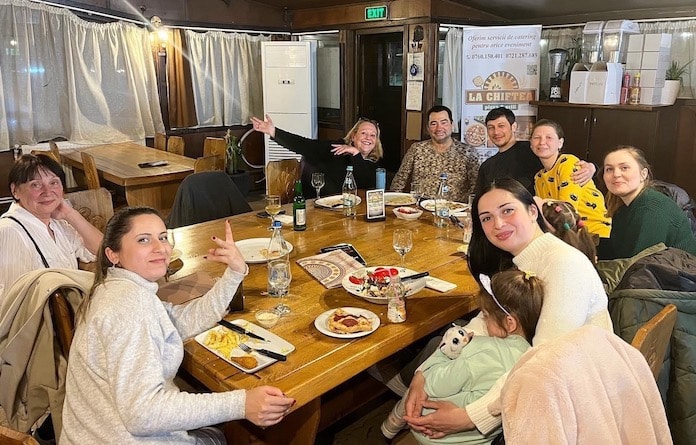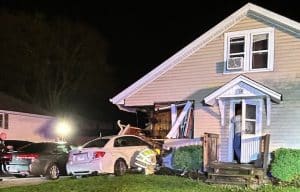Romania’s refuge from the war zone

What started as a mission to feed hungry kids in Romania is now opening its doors to individuals across the Ukrainian border fleeing from the dangers of war.
Cindy Getchman, daughter of late Sister Cities of Porta Loo President Bill Getchman of Waterloo, started Stepping Stone Missions in 2009 to help the people of Medgidia, Romania.
The mission was met with great need, as Getchman said Medgidia is known as the poorest region in all of Romania.
“Because the families are so impoverished, we work together with the whole family. We help provide food to the family and medical (services). It’s like a big, giant house,” Getchman said of Stepping Stone.
In an attempt to break the cycle of poverty, the mission provides literacy classes for moms and children as well, encouraging kids to stay in school – many of the mission’s kids are first-generation students – and empower their parents.
Another struggle that plagues the region is human trafficking, which Getchman is now beginning to tackle.
“Human trafficking is really terrible in our area; all of our kids are at risk to be trafficked or be traffickers,” she said. “Maybe six years ago a girl (from Romania) was murdered during an act of prostitution and at that time I said ‘I cannot stand by and watch this happen anymore.’ So now I’m in the process of building a house called Casa Nissi, which is ‘House of Freedom.’”
Casa Nissi will serve as a safe place for victims of trafficking and is part of a larger project titled “Bring them Home.”
In addition to these multi-faceted efforts, Stepping Stone, local churches and other organizations are also banding together to help those fleeing the war in Ukraine.
According to National Public Radio, Romania has seen the second-largest influx of displaced Ukrainians since the war began. As of April 6, the United Nations reported Romania had taken in over 662,000 refugees, and this figure continues to climb.
For Stepping Stone – which lies approximately 70 miles from the Southeastern Ukrainian border – this has meant aiding families from all different parts of Ukraine. Some of these families are just passing through Medgidia on their way to more permanent shelter outside Romania, while others are setting up a slightly more permanent residence in Stepping Stone’s community center.
“They came on three-day journeys, four-day journeys, cars, trains, buses, people gave them a ride, they walked,” Getchman said. “You just come with everything that you can carry. It’s just a terrible situation. It’s a war zone (in Ukraine). There’s bombing, shelling, running. One couple walked (so far) that they needed new shoes – their shoes were broken.”
Stepping Stone provides Ukrainian families in need with shelter, food, water and other supplies. Additionally, Getchman gives them money that has been donated to the mission to help the families.
“It’s not fair that they can’t buy what they want. They shouldn’t have to come to me,” Getchman said. “But, they have no jobs, no work, they don’t have anything.”
Getchman said pastors in her region and those in Ukraine have formed strong partnerships, allowing Romania to further outstretch a helping hand.
“Not only are they taking stuff into Ukraine, they’re taking people out of Ukraine and bringing them into Romania, setting up community centers, apartments, they’re welcoming them into the churches and providing food, clothes and shelter, medicines and counseling,” Getchman said.
“I have never seen people come together so strongly – the churches, Catholics, Baptists, Pentecostals,” she continued. “It’s just amazing how everybody is really working together to help these guys.”
Aiding those displaced by the war in Romania is not without unique challenges, though.
“Very few speak English or Romanian, but they speak Russian and Ukrainian,” Getchman said. “Google Translate could be more effective. They could develop it better in Russian, so it’s really tough sometimes to communicate.”
Those crossing the border are especially vulnerable to being trafficked, just as those who call Romania home are, Getchman said.
“In general, it’s a terrible thing because guess who is crossing the borders? Women and children … churches are being a community center and a church, but they’re also setting up meetings for trafficking awareness to educate people,” Getchman said.
While the people in Romania face such challenges every day, they are willing to help their Ukrainian neighbors, and those seeking refuge at the mission are helping with everyday operations such as cooking and looking after the mission’s kids, Getchman said.
“They’re just like part of our family now. They love us, we love them,” Getchman said.
Those wanting to keep up with Stepping Stone Missions can follow their Facebook page. To donate or otherwise learn more about the mission, visit steppingstonemissions.org.






